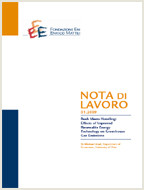The French nuclear bet

16.03.2017
Quentin Perrier (CIRED, ENGIE)
D81, O13, Q40, Q48
Power System, Nuclear Power, Uncertainty, Investment Optimization, Robust Decision Making
Energy Scenarios and Policy
Manfred Hafner
Following the first oil crisis, France launched the world’s largest ever nuclear energy program, commissioning 58 new reactors. These reactors are now reaching 40 years of age, the end of their technological lifetime. This places France at an energy policy crossroads: should the reactors be retrofitted or should they be decommissioned? The cost-optimal decision depends on several factors going forward, in particular the expected costs of nuclear energy production, electricity demand levels and carbon prices, all of which are subject to significant uncertainty. To deal with these uncertainties, we apply the Robust Decision Making framework to determine which reactors should be retrofitted. We build an investment and dispatch optimization model, calibrated for France. Then we use it to study 27 retrofit strategies for all combinations of uncertain parameters, which amounts to nearly 3,000 runs. Our analysis produces two robust strategies, which involve shutting down between 7 and 14 of the 14 oldest reactors, while extending the lifetime of all remaining reactors. These strategies provide a hedge against the risks of unexpected increases in retrofit costs, low demand and low carbon price. Our robust strategies differ from the official French government scenarios on the timing and number of reactors suggested to be decommissioned. They provide a timely contribution to the current debate on the extension of lifetime of nuclear plants in France.
***
Suggested citation: Perrier, Q., (2017), ‘The French Nuclear Bet’, Nota di Lavoro 18.2017, Milan, Italy: Fondazione Eni Enrico Mattei
